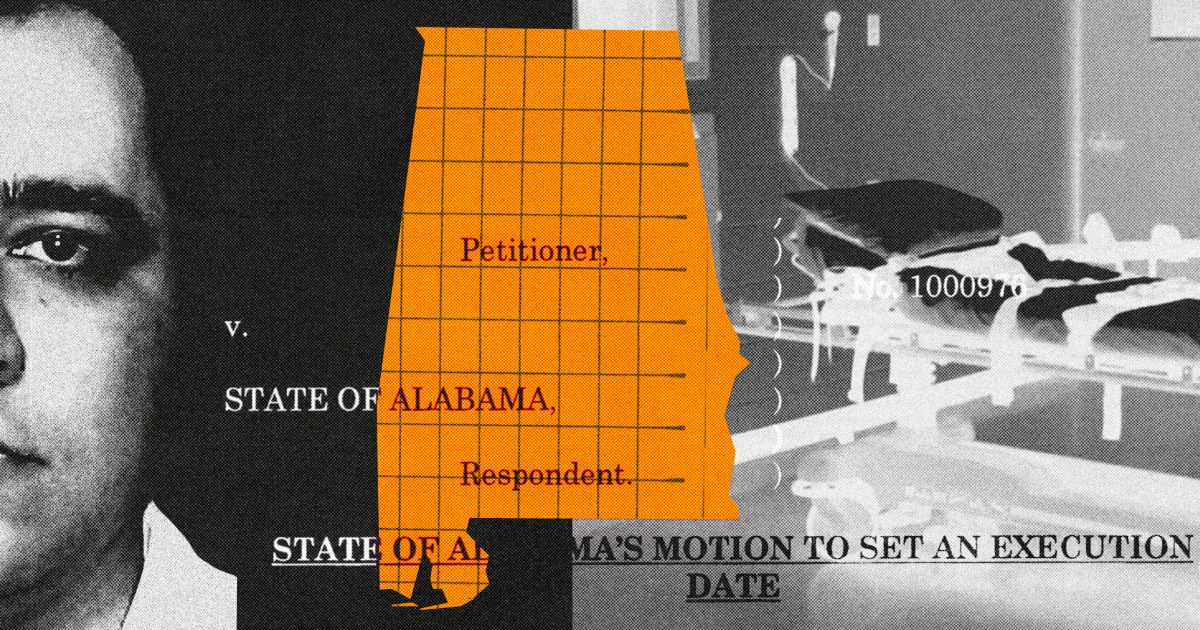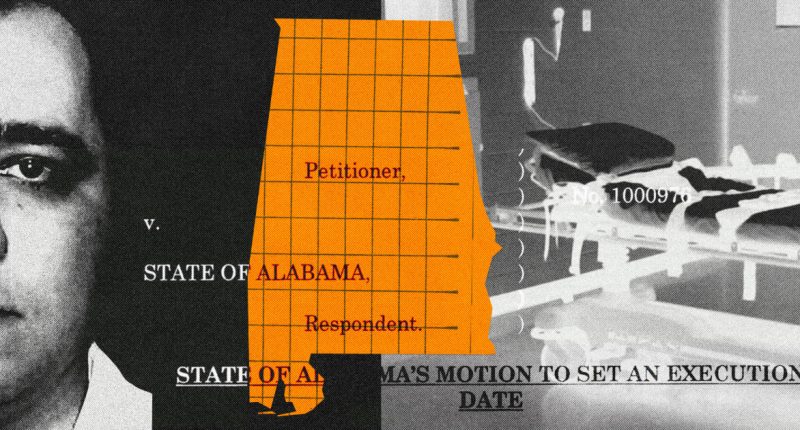
ATMORE, Ala. — Alabama Attorney General Steve Marshall on Friday vowed to continue using nitrogen gas in executions and offered to assist other states interested in the novel method, while fending off concerns that an inmate executed the night before did not become unconscious as quickly as expected and thrashed on the gurney, according to witnesses.
“What occurred last night was textbook,” Marshall told reporters after the execution of Kenneth Eugene Smith on Thursday evening by nitrogen hypoxia, in which he was forced to breathe only nitrogen through a mask and was denied oxygen.
The execution, the first in the U.S. using nitrogen gas, lasted roughly 30 minutes from the time it started to Smith’s time of death. Marshall said Friday that nitrogen hypoxia “is no longer an untested method — it is a proven one.”
But the physical reaction of Smith, who was 58 and on death row for over three decades for a 1988 murder-for-hire slaying, was already being highly scrutinized after a 2022 attempt to execute him by lethal injection failed when prison staff could not locate a suitable vein.
Media witnesses to Thursday’s execution said Smith was conscious for several minutes into the execution and then appeared to shake and writhe on the gurney for two minutes. They said that was followed by several minutes of deep breaths until his breathing slowed and it was no longer perceptible.
The state had said in court filings that “the experts agree that nitrogen hypoxia is painless because it causes unconsciousness in seconds,” and death within minutes.
Marshall could not say exactly when the nitrogen began to flow into the mask, making it difficult to discern the timing.
But one media witness said it appeared to take longer than the state had suggested for Smith to become unconscious and die.
“It’s interesting to see the attorney general say that everything went consistent with plans that they laid out,” Lee Hedgepeth, an Alabama reporter, said on MSNBC.
“We saw him begin violently shaking, thrashing against the straps that held him down,” Hedgepeth said of Smith. “This was the fifth execution that I’ve witnessed in Alabama, and I’ve never seen such a violent execution or a violent reaction to the means of execution.”
He added that Smith had dry-heaved into the mask.
In court documents arguing for various courts to block the execution, Smith’s lawyers said he feared he would vomit into the mask and choke — only adding to his claims of cruel and unusual punishment. The U.S. Supreme Court rejected Smith’s request to block his execution late Thursday in a 6-3 decision, with the court’s three liberal justices dissenting. Justice Sonia Sotomayor agreed that Smith’s fears of “superadded” pain and prolonged death were warranted and he had been selected as a “guinea pig.”
The execution drew criticism from civil rights and religious groups both nationally and around the globe, with United Nations human rights experts saying it “will likely violate the prohibition on torture.”
Smith’s spiritual adviser, the Rev. Jeff Hood, who was permitted in the chamber to give him his last rites before the mask was strapped on and who has participated in multiple executions in the past year, said he did not expect to see Smith “heaving up and down on the gurney.”
“I mean, it really was like watching someone put a plastic bag over someone’s head and just to see what happens, and holding it as tight as they can, as long as they can, to watch the person resist and shake,” Hood said.
“They repeatedly said that he would not be able to resist the nitrogen, would be unconscious within seconds,” Hood said, adding that that did not happen. “He’ll be unconscious in a matter of seconds. And then he looks like a fish out of water.”
Joel Zivot, a physician and an associate professor of anesthesiology at Emory University in Atlanta, had voiced concerns about the risks of nitrogen hypoxia and the possibility of slow asphyxiation that could “result in a torturous death.”
He said the idea that administering the method once does not mean it has been proven because it remains untested in a credible scientific and impartial setting.
“We have observations now, and we know it would take a longer time than they said it would. We know he was writhing around, which I know it doesn’t indicate anything good,” Zivot said. “If they think this was him enjoying his hypoxia, then saying what happened last night was ‘textbook’ are just words without meaning.”
Alabama has 165 inmates on death row. Marshall said that 43 others have also chosen nitrogen hypoxia over lethal injection as their preferred method of execution.
“We’ll definitely have more nitrogen hypoxia executions in Alabama,” he added Friday.
With lethal injections becoming increasingly difficult to carry out because of a shortage in the necessary drugs — as manufacturers decline to make them available for the purpose of executions — observers say nitrogen gas may eventually be a go-to alternative for many states. It is abundant, found in the Earth’s atmosphere and soil.
Two states, Mississippi and Oklahoma, have approved nitrogen hypoxia in executions in addition to other methods, although neither has a protocol in place like Alabama. Alabama made nitrogen hypoxia a legal method in 2018 but moved to install its protocol after a series of problematic executions using lethal injection that led to a temporary pause in the practice in 2022.
Oklahoma had a moratorium on executions for six years until 2021 following a series of bungled executions of its own related to lethal injection.
Officials in Oklahoma last year said they would be watching what happens in Alabama, but wouldn’t immediately commit to making nitrogen hypoxia an option.
“I have a continuously watchful eye on the progress Alabama is making with this new method,” Oklahoma Department of Corrections Director Steven Harpe said in a statement Friday. “We are interested in the option of nitrogen hypoxia because it releases the state from the burden of the three-drug protocol. If nitrogen hypoxia is proven to be safe, effective and easy to administer, the availability of nitrogen reduces the strain of locating and obtaining the sedatives and paralytics for our current protocol.”
Nebraska state Sen. Loren Lippincott said he hopes a bill he introduced this month to make nitrogen hypoxia another option for death row inmates besides lethal injection can advance. The state has been unable to carry out an execution since 2018 because it can’t obtain the necessary lethal injection drugs, he said.
“Given the outcome of the Alabama case, we are confident that this will be a highly debated bill in our state,” Lippincott said in an email. “If given this option, we are certain that the Nebraska Department of Corrections will use this method to humanely give justice to victims’ families and our community.”
In December, in a phone interview from prison with NBC News, Smith predicted the use of nitrogen hypoxia would only create more “victims” if the state of Alabama proceeded. He also had a message for his fellow death row inmates, some of whom said the mood in the prison Friday was “deflated and anxious, for sure.”
“As goes Kenny,” he said, “so goes the rest of my brothers.”
Abigail Brooks reported from Atmore, and Erik Ortiz from New York.
Source: | This article originally belongs to Nbcnews.com










